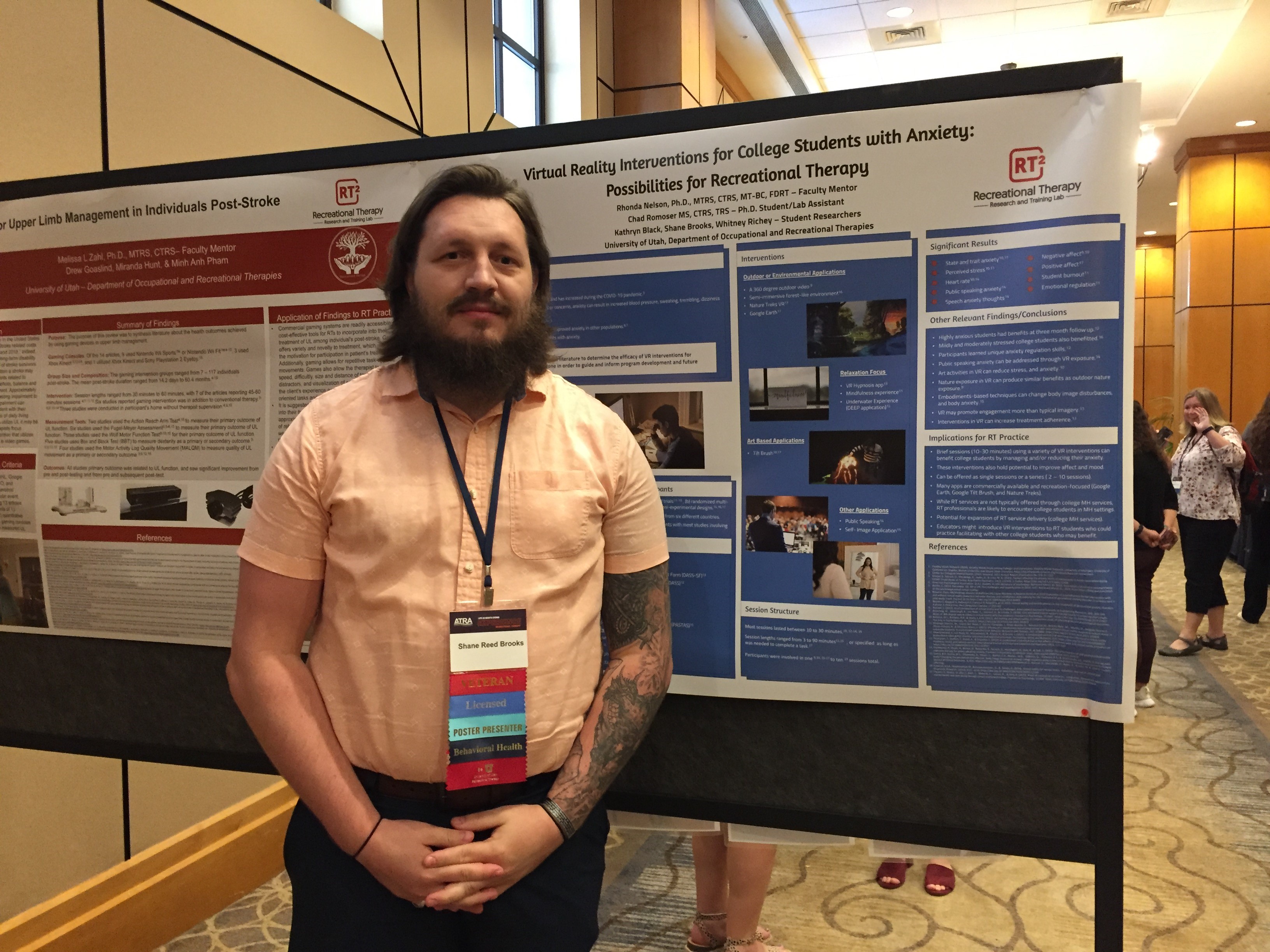
Sweeps are sweet, especially at national conferences. Faculty-mentored student groups in the College’s Department of Occupational and Recreational Therapies took first and second place in a research poster presentation section at the American Therapeutic Recreation Association annual conference in September. It’s a departmental first, and both groups focused on the application of gaming and technology as a therapeutic intervention.
Melissa Zahl, PhD, MTRS, CTRS, FDRT and her student group took first place in the Research to Practice Category. Their poster focused on “Gaming for Upper Limb Management for Individuals Post-Stroke.” Rhonda Nelson, PhD, MTRS, CTRS, MT-BC, FDRT and her student group claimed second in the category, for “Virtual Reality Interventions for College Students with Anxiety: Possibilities for Recreational Therapy.”

Research Lab Creates Winning Topics
Both groups’ research came out of the department’s Recreational Therapy Research and Training Lab (RT2), founded and directed by Nelson, where students are mentored by Nelson and Zahl.
“One purpose of the lab is to provide opportunities for undergraduate students to develop skills in reading, reviewing, and summarizing research on a topic,” Nelson said. “We also mentor them on different avenues for disseminating research findings so practitioners can use that information.”
Undergraduate students in the recreational therapy program who are interested in research apply to join the lab, and once they are accepted, they work in a small group with a faculty mentor. Mentors choose topics for the students to research, then they meet weekly and discuss different ways therapists and clinicians could use the research findings. When it came to the conference papers, students used their research summaries and recommendations to create the winning poster combinations.
Gaming Isn't Just For Fun
“Our group’s topic just happened to align with one of the populations I work with, which is spinal cord injury and stroke,” Zahl said. “The group came up with the idea to look at gaming and the different attributes that gaming could provide. We decided to focus on upper limb management—there’s a lot of research supporting the benefits of gaming using systems like Nintendo Wii, Xbox, and the Kinect.”
Zahl said her group focused on upper limb management because most of the research targeted this area, and because the upper limbs are necessary for almost every recreational activity. After studying the research, they determined that gaming was not only beneficial for post-stroke individuals physically, but also cognitively, socially and emotionally.
“Based on our findings, we recommended that recreational therapists utilize 45-minute gaming sessions, which can be done one on one or in small groups,” Zahl said. “It really is a nice adjunctive therapy to add on top of occupational or physical therapy.”
Virtual Reality Can Alleviate Anxiety
Nelson’s group looked at whether virtual reality interventions could be used to reduce anxiety in college students. They wanted to give focused attention to VR applications that are commercially available because these could also be used for leisure purposes.
“There’s an increased prevalence of mental health issues in college and university students,” Nelson said. “Unfortunately, traditional campus mental health services can’t always meet the demand or individual student needs. We decided to look at whether we could use a recreational activity like VR as another possible way to help.”
It turns out that VR isn’t just for fun—Nelson’s group found studies demonstrating the benefits of the interventions in decreasing anxiety and improving mood. Although recreational therapists don’t typically work in campus mental health centers, they are widely employed in other mental health settings where they treat college students. Given the rising mental health needs in this population, Nelson’s group concluded recreational therapists might expand their services to college students by offering campus-based VR programs.
“We’re looking at where we might go next with it in terms of possible research,” Nelson said. “That was part of the purpose of the project, to determine how we might design a study to offer recreation-based VR interventions to students at the U who might be dealing with anxiety.”
The College’s recreational therapy faculty and students have received individual awards at previous ATRA conferences, but this is the first time they’ve placed first and second in a poster presentation section. It’s a big accomplishment, considering the level of quality research and competition across the nation.
“I was very happy for the students, they worked really hard on these submissions,” Zahl said. “It’s nice to get that win and be recognized nationally.”
By Sarah Shebek